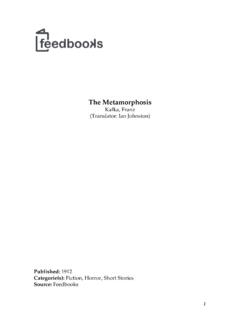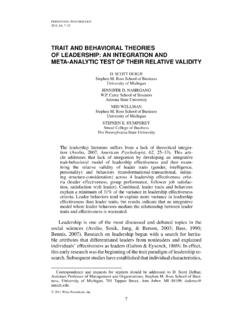Transcription of Personality and Individual Differences
1 The Big Five Personality traits , learning styles, and academic achievementMeera Komarraju , Steven J. Karau, Ronald R. Schmeck, Alen AvdicSouthern Illinois University at Carbondale, United Statesarticle infoArticle history:Received 15 January 2011 Received in revised form 14 April 2011 Accepted 27 April 2011 Available online 2 June 2011 Keywords:Learning stylesBig FiveAcademic achievementSynthesis-analysisConscientio usnessReflectiveOpennessElaborative processingabstractPersonality and learning styles are both likely to play significant roles in influencing academic achieve-ment. College students (308 undergraduates) completed the Five Factor Inventory and the Inventory ofLearning Processes and reported their grade point average.
2 Two of the Big Five traits , conscientiousnessand agreeableness, were positively related with all four learning styles (synthesis analysis, methodicalstudy, fact retention, and elaborative processing), whereas neuroticism was negatively related with allfour learning styles. In addition, extraversion and openness were positively related with elaborative pro-cessing. The Big Five together explained 14% of the variance in grade point average (GPA), and learningstyles explained an additional 3%, suggesting that both Personality traits and learning styles contributeto academic performance. Further, the relationship between openness and GPA was mediated by reflec-tive learning styles (synthesis-analysis and elaborative processing).
3 These latter results suggest thatbeing intellectually curious fully enhances academic performance when students combine this scholarlyinterest with thoughtful information processing. Implications of these results are discussed in the contextof teaching techniques and curriculum design. 2011 Elsevier Ltd. All rights IntroductionThe quality of students thoughts is critical to learning andcould potentially determine their academic achievement. Collegestudents differ in how they process, encode, recall, organize, andapply the information they learn; some are thoughtful learnersand others process information more superficially. Are these indi-vidual Differences in preferred learning strategies and depth ofinformation processing related to Personality ?
4 Do learning strate-gies mediate the link between Personality traits and academicachievement? We attempted to answer these questions by investi-gating the relationships between Personality traits , learning styles,and academic achievement among college Relevant prior Big FiveThe Big Five framework of Personality traits (Costa & McCrae,1992) has emerged as a robust and parsimonious model forunderstanding the relationship between Personality and variousacademic behaviors (Poropat, 2009). Conscientiousness is exempli-fied by being disciplined, organized, and refers to degree of emotional stability, impulse con-trol, and anxiety. Extraversion is displayed through a higher degreeof sociability, assertiveness, and talkativeness.
5 Openness is re-flected in a strong intellectual curiosity and a preference for nov-elty and variety. Finally, agreeableness refers to being helpful,cooperative, and sympathetic towards others. There is some evi-dence that Personality and motivation are intricately tied withindividual Differences in learning styles, and it is recommendedthat educators go beyond the current emphasis on cognition andinclude these variables in understanding academic behavior(Miller, 1991). Learning stylesIn addition to Personality , learning styles are an Individual dif-ference factor that represents enduring and stable approaches toprocessing information (Snyder, 2000). Although there are severalconceptual models of learning styles, we adoptedSchmeck, Ribich,and Ramanaiah s (1977)model because it identifies learning strat-egies that are likely to enhance learning and academic achievementfrom the framework of effective information processing.
6 This mod-el adopts the view that memory is a by-product of careful thinkingand depth of processing (Craik & Lockhart, 1972). In addition,rather than attempting to classify learners into mutually exclusivecategories, this framework suggests that students tend to adopteither agentic/shallow processing (with the performance goal ofdoing well on a test) or reflective/deep processing (with the mas-tery goal of deep understanding and long-term retention). What0191-8869/$ - see front matter 2011 Elsevier Ltd. All rights Corresponding author. Address: Department of Psychology, Southern IllinoisUniversity, Carbondale, IL 62901-6502, United States. Tel.: +1 618 453 3543; fax: +1618 453 Komarraju). Personality and Individual Differences 51 (2011) 472 477 Contents lists available atScienceDirectPersonality and Individual Differencesjournal homepage: remember is a function of how they process informationfrom lectures, readings, or discussions.
7 Thus, students who areencouraged to think more deeply about the information are likelyto encode information more thoroughly and remember it of processing also has clear implications for Personality ,and especially openness, making it a promising candidate for medi-ating relationships in the current the four learning styles, synthesis-analysis refers to process-ing information, forming categories, and organizing them into hier-archies. Elaborative processing refers to connecting and applyingnew ideas to existing knowledge and to the learner s personalexperiences. Methodical study consists of what is traditionallyemphasized in most academic environments, such as being carefuland methodical while completing all assignments on time.
8 Factretention involves processing information so that the main ideasare memorized with the goal of doing well on tests rather thanunderstanding the meaning of what is being research suggests that individuals differ in their intellec-tual styles and preferences for how they gain knowledge(Sternberg & Zhang, 2001; Zhang, 2003). For example, studentstend to utilize more complex strategies invoking deep processingas they progress from the freshman to the senior level (Bartling,1988; Jakoubek & Swenson, 1993). Learning styles and personalityEvidence also suggests complex links between learning stylesand Personality traits . For instance, relative to shallow processors,deep processors are more likely to use appropriate study meth-ods, draw conclusions effectively, and have a stronger internal lo-cus of control (Gadzella, Ginther, Masten, & Guthrie, 1997).
9 Deepprocessors are also more likely to be conscientiousness, intellec-tually curious, extraverted (Furnham, 1992; Zhang, 2003), andemotionally stable (Geisler-Brenstein, Schmeck, & Hetherington,1996). Finally, students who prefer a structured learning environ-ment and intuitive processing are prone to anxiety and worry(Zhang, 2003), whereas those preferring an activist and pragma-tist style are more extraverted (Furnham, 1992). Thus, learningstyles and Personality traits appear to be intricately connected,although how they jointly influence academic achievement Personality and academic achievementPersonality traits also influence academic achievement. Forinstance, conscientiousness has consistently emerged as a stablepredictor of exam performance (Chamorro-Premuzic & Furnham,2003) and GPA (Conard, 2006).
10 Combinations of Big Five traits havealso been found to predict various educational outcomes. Namely,conscientiousness and openness predict course performance(Paunonen & Ashton, 2001), and agreeableness, conscientiousness,and openness predict overall academic performance (Farsides &Woodfield, 2003; Poropat, 2009). Extraversion, openness, andconscientiousness have also been found to predict GPA, especiallywhen students apply previously accumulated knowledge to reallife settings (Lievens, Ones, & Dilchert, 2009). In contrast, neuroti-cism or emotional instability is negatively associated with aca-demic achievement (Chamorro-Premuzic & Furnham, 2003). Inaddition to the Big Five, other traits such as grit or perseverance(Duckworth, Peterson, Matthews, & Kelly, 2007) are also predictiveof academic performance.




